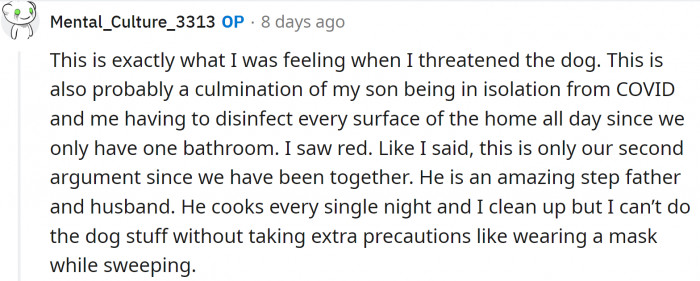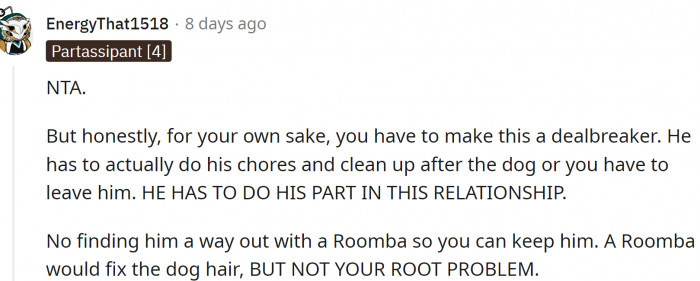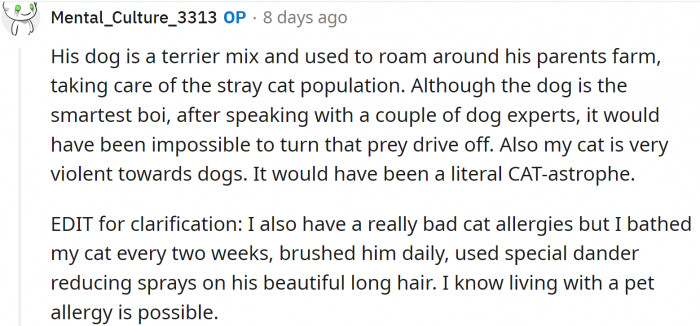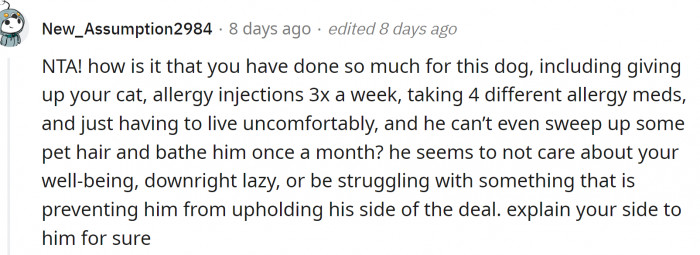Woman With Allergies Threatens To Re-Home Her Husband’s Dog Because He Won’t Clean Up After It
We have an interesting story today. It was posted by a 30-year-old woman.
She and her husband have been married for over two and a half years, and they started dating in 2016. They didn’t live together until they were married because he has an 8-year-old large breed dog.
OP is allergic to dogs and has had to make a lot of sacrifices – she started taking allergy injections and has been taking three doses weekly since March 2020 in preparation for living with the dog. She is also taking four different allergy medications.
They bought two air purifiers with special pet dander air filters. On top of that, she washes her bedding at least once a week to keep the dander and pet hair at bay.
She works from home and has to wash her hands and face every time she touches the dog. Despite all of these efforts, she loves the dog.
However, this love is threatened by her husband’s reluctance to honor his part of the deal. Specifically, he was supposed to bathe and brush the dog frequently.
When OP was hit by a severe allergy attack, things came to a boiling point. OP even threatened to send the dog away to her mother-in-law’s house.
Her husband objected strongly and made threats of his own. Now OP asks what to do. Take a look and think about what you would do:
OP asks:

She and her husband have been dating for quite some time and got married two years ago. One of the main reasons for postponing the marriage was the husband's dog

OP made a lot of sacrifices to make the marriage work.

The Stress of Allergies and Relationships
When allergies enter the equation, they can add another layer of complexity to pet ownership and relationships. The stress associated with managing allergies can lead to heightened emotional responses, impacting overall relationship dynamics. Research from the University of Virginia indicates that health issues can significantly affect interpersonal relationships, often leading to feelings of frustration and helplessness.
Understanding how allergies affect both physical and emotional well-being is essential for effective communication between partners.
The Intersection of Allergies and Pet Ownership
Dr. Rachel Adams, a psychologist specializing in health psychology at Duke University, emphasizes that health-related issues can significantly impact interpersonal relationships.
Her research indicates that when an individual has allergies, it can lead to feelings of frustration, especially when family dynamics are involved.
This frustration often manifests in conflicts over shared responsibilities, particularly regarding pet care.
She has frequent allergy attacks, even with all the medication she is taking.

Things would be better if her husband took care of his part of the deal - cleaning up after the dog, bathing, and grooming it.

It all came to a boiling point:

Furthermore, the demand for personal space and comfort can lead to misunderstandings between partners. A clinical psychologist notes that when one partner feels their health needs are not being prioritized, it can evoke feelings of neglect or resentment. These emotions can become barriers to effective communication, creating a cycle of frustration.
Addressing these concerns openly is crucial in maintaining a healthy relationship.
Studies in behavioral psychology show that unresolved health issues can lead to emotional dysregulation, which affects communication and relationships.
When individuals feel their health is compromised, their reactions may become heightened, leading to conflicts that might not have occurred otherwise.
Understanding this pattern can help individuals approach conflicts with more empathy and patience.
Now OP wants to spend the money she's been saving for a family vacation on a Roomba.

The Redditors couldn't believe the sacrifices she made

OP made some things clearer:

Exploring the Role of Compromise
Finding a compromise in such situations is essential. Studies show that couples who actively seek to understand each other's needs and feelings tend to have more satisfying relationships. A research study published in the Journal of Marriage and Family found that successful partnerships are built on mutual respect and a willingness to adjust to each other’s needs.
In this case, exploring cleaning solutions or establishing pet-free zones could be a way to balance health needs with the dog’s presence.
Communication Strategies for Health-Related Conflicts
Effective communication is crucial when health issues arise in relationships, particularly when pets are involved.
Utilizing 'I' statements can help express feelings without placing blame, fostering a healthier dialogue.
Research indicates that addressing health concerns openly can alleviate tension and promote understanding between partners.
OP's husband is clearly not pulling his weight

One Redditor gave OP good advice:

Another good advice:

Proposing practical solutions, like using air purifiers or creating designated pet areas, can help alleviate some of the stress associated with allergies. Research indicates that establishing clear boundaries and responsibilities can lead to improved relationship satisfaction. Engaging in these solutions together can also foster teamwork and strengthen the bond between partners.
Moreover, showing empathy towards each other’s experiences can create a more supportive atmosphere.
Psychological studies also suggest that developing conflict resolution skills can improve outcomes in health-related disputes.
Practicing active listening and empathy can create a supportive environment, allowing individuals to express their concerns without fear of judgment.
This approach not only helps resolve current conflicts but also strengthens the relationship overall.
Roomba can help. But it won't fix the problem.

OP said:

Sweeping is not that hard.

Practical Solutions for Managing Health Conflicts
To manage health-related conflicts, couples should create a plan that addresses allergies and responsibilities regarding pets.
This plan can involve setting boundaries around pet care and discussing how to accommodate each other's health needs.
Involving a mediator or therapist can be beneficial in navigating these discussions, ensuring both parties feel heard and respected.
And rehoming means sending it over to his mom's house.

Can they?

This is ridiculous. He won't pay for something he can do by himself, but he doesn't do it.

Behavioral research highlights the importance of creating a supportive environment where both partners feel comfortable discussing their needs.
Encouraging open dialogue about health concerns can lead to more effective resolutions and healthier relationships.
By prioritizing each other's well-being, couples can navigate these challenges more effectively.
OP says - Roomba it is.

One funny Redditor gave OP an interesting idea:

There are so many things wrong here. The OP is asking, “AITA for threatening to re-home the family dog?”
But her main question seems to be, “Will Roomba save my marriage?” It is clear that she has made a lot of sacrifices, and she even put her health at risk.
And her husband is too lazy to bathe the dog. She says he is a good husband and a stepfather, and that’s alright.
But how can endangering your spouse’s life count as being a good husband?
Understanding the Emotional Impact of Allergies
Research published in the Journal of Health Psychology shows that health issues can profoundly affect emotional well-being.
When individuals experience chronic health conditions, it can lead to feelings of isolation and frustration, which may spill over into relationships.
Recognizing this emotional impact is essential for fostering understanding and support in partnerships.
Psychological Analysis
This situation illustrates how health challenges can strain relationships, particularly when communication is lacking.
Addressing these issues with empathy and understanding can significantly enhance the quality of the relationship and reduce conflict.
Analysis generated by AI
Analysis & Alternative Approaches
In conclusion, managing health-related conflicts in relationships requires empathy, communication, and understanding.
By addressing health issues openly and collaboratively, couples can foster stronger bonds and navigate challenges more effectively.
As noted by health psychologists, prioritizing emotional well-being is crucial for maintaining healthy relationships.
Analysis & Alternative Approaches
Addressing health issues in relationships requires empathy and open dialogue. Research supports the idea that understanding each partner's needs can foster stronger connections.
By working together to find practical solutions, couples can navigate the complexities of health concerns while maintaining a loving and supportive partnership.



